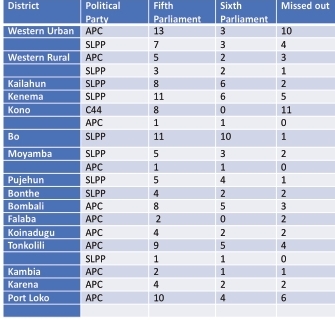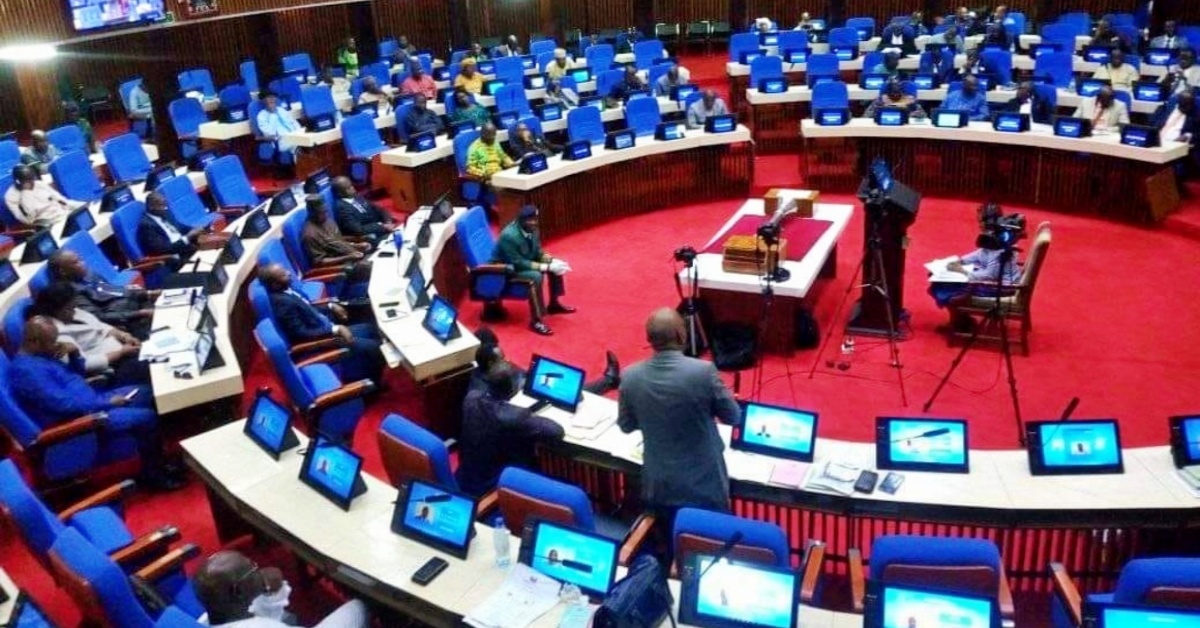Sierra Leone’s political landscape has experienced a significant shake-up as 61 Members of Parliament (MPs) who served in the fifth Parliament failed to secure their positions in the sixth Parliament of the Second Republic.
This major shift in political power was driven by a combination of personal choices and political circumstances following the reintroduction of the Proportional Representation System (PR) after a 21-year hiatus.
The Electoral Commission Sierra Leone (ECSL) recently published the parliamentary election results, revealing that over half, 33 MPs representing the All People’s Congress (APC) in the previous Parliament, lost their party’s endorsement during primary elections. Among the prominent figures who failed to secure their positions were the former Opposition Leader and Vice-Presidential candidate in the June 24th elections, Hon Chernor Maju Bah, and Hon Ibrahim Ben-Kargbo, the former Deputy Opposition Leader in Parliament.
Similarly, 19 MPs from the ruling Sierra Leone People’s Party (SLPP) in the fifth Parliament were unable to secure their seats in the sixth Parliament. Many of them were unsuccessful in their party’s primaries, while others were not placed in the top half of the party list under the PR System.
The Coalition for Change (C4C) party, which held eight seats in the fifth Parliament, faced legal issues that prevented them from contesting in the current elections. Consequently, three of their former MPs, Hon Saa Emerson Lamina, Hon Rebecca Yei Sam, and Hon Musa Fofonah, defected to the ruling SLPP and successfully secured seats in the sixth Parliament.
However, Hon Sahr Charles, another C4C MP from the fifth Parliament, failed to secure a seat as an Independent Candidate, while the remaining four C4C MPs did not contest the election.
The National Grand Coalition (NGC), the third-largest party in the fifth Parliament with four MPs, formed an alliance with the SLPP for the June 2023 elections. Despite this partnership, the NGC failed to win a single seat in Kambia district, with the SLPP winning two seats and the APC winning four, leaving the NGC without representation in the sixth Parliament.
Notably, the fifth Parliament included three Independent MPs, two from Kailahun and one from Pujehun district. All three MPs returned to their original political party, the SLPP, and successfully maintained their seats in Parliament, now as SLPP MPs rather than Independent MPs.
Among the 33 APC MPs who missed out on the sixth Parliament were the top four leaders from the fifth Parliament: Hon Chernor Maju Bah (former Leader of the Opposition), Hon Ibrahim Ben-Kargbo (former Deputy Opposition Leader), Hon Ajibola Manley-Spaine, and Hon Hassan Abdoul Sesay (former Opposition Whip).
In contrast, the ruling SLPP only lost one of its leaders, Hon Alusine Kanneh, the Deputy Chief Whip, who missed out on the sixth Parliament due to his placement at No. 23 on the party list. The battle for the positions of Speaker and Deputy Speaker has already begun, promising an intense competition.
Interestingly, several vocal SLPP MPs who championed the PR System during the campaign and debates did not secure seats in the sixth Parliament. Some were unsuccessful in their party’s primaries, while others did not rank high enough on the candidate list.
The breakdown of MPs from the fifth Parliament and those who successfully secured seats in the sixth Parliament by district is as follows:













A Great Decision ✌️🤪